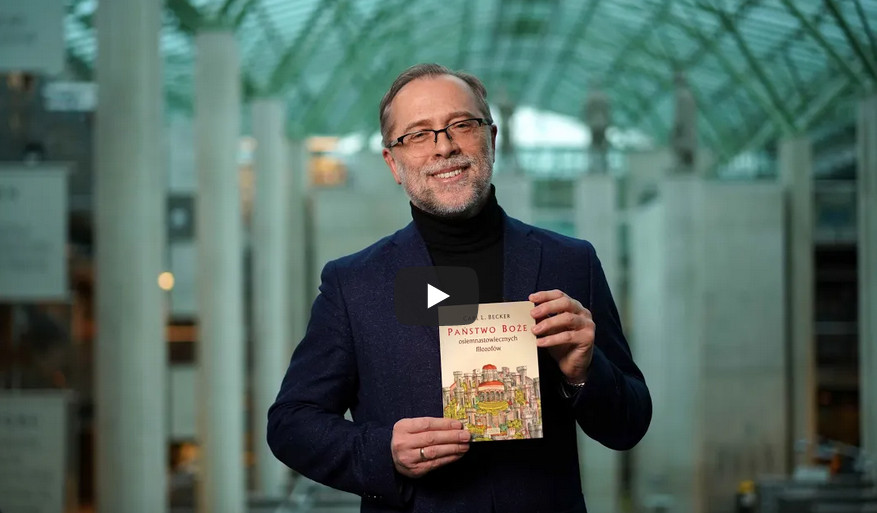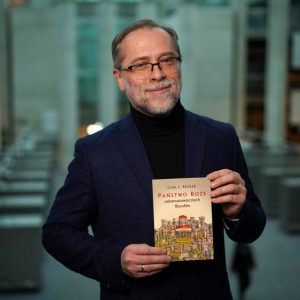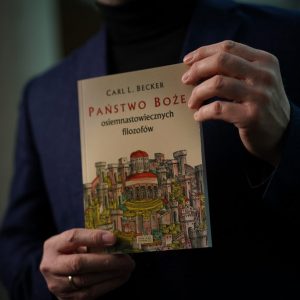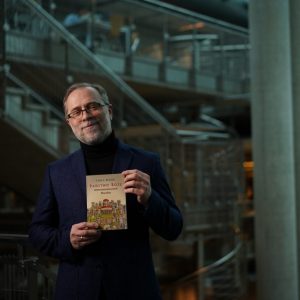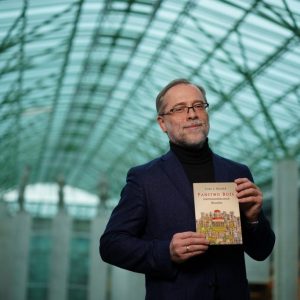“The author of a book published almost a century ago teaches us to think deeply about the method of studying the past, emphasises the need to understand our present, but also raises important questions about the future. We will soon find out whether Prof. Becker’s conjecture about the year 2032 will be true” – this is how Prof. Paweł Stępień from the Faculty of „Artes Liberales”, a director of the UW’s Interdisciplinary Doctoral School, describes the book “The Heavenly City of the Eighteenth-Century Philosophers”.
Prof. Paweł Stępień is a literary scholar, a research and teaching fellow at the Faculty of „Artes Liberales”, the University of Warsaw. He defended his doctoral thesis “Baroque Poet’s Attitude Towards Evanescence and Death: Hieronim Morsztyn – Szymon Zimorowic – Jan Andrzej Morsztyn” in 1996, and in 2004 he was awarded a postdoctoral degree for his thesis “On the Religious Literature of Polish Middle Ages: Studies on Four Texts: The Sermon on Saint Catherine’s Day, The St. Alexis Legend, The Holy Cross Lament, The Psalter of Jesus”. He received the title of professor in 2015.
His main areas of research include works of ancient literature as a microcosm of culture, as well as the Old Polish literature in the context of philosophy and theology, especially the mediaeval religious literature in the context of theology, aesthetics, and poetics of the time, and 20th-century Polish poetry in the face of the cultural traditions of past eras.
Prof. Paweł Stępień has been a director of the UW’s Interdisciplinary Doctoral School since 2021. Previously – from 2007 to 2016 – he was the Rector’s Deputy for Quality of Education.
Four lectures
“We are dealing with a book that consists of merely four chapters, but its slim volume is counterbalanced by the great intellectual weight of Prof. Carl Lotus Becker’s lectures” – this is how Prof. Paweł Stępień described the book The Heavenly City of the Eighteenth-Century Philosophers.
The work is almost a hundred years old. In April 1931, the Cornell University professor specialising in the history of modern Europe, delivered four lectures at the Yale Law School, which he then published in May 1932. His small book is one of the most important works of American historiography of the first half of the 20th century.
“The book is devoted to the ideas of 18th-century philosophers about the past, present and future, and its perverse title alludes to the fierce battle that Enlightenment thinkers waged against the Christian tradition,” Prof. Paweł Stępień said, adding: “The author demonstrates with great perspicacity that, contrary to appearances, the philosophers of the 18th century, while engaged in a passionate dispute with the feudal past, remained related to the philosophers of mediaeval Europe.”
The author’s “prediction”
In 1931, at the time of writing The Heavenly City of the Eighteenth-Century Philosophers, Carl L. Becker was reaching his sixties and already became a widely recognised historian whose research had shed new light on various aspects of the American Revolution and the origin of the United States. In the same year, the scholar delivered a lecture on historical method, which he provocatively titled “Everyman His Own Historian”. There, he argued that a historian, while delving into the past, remains immersed primarily in his own present.
“When talking about the culture of the Enlightenment, the author characterises with great freedom both 20th and 13th century ideas about the world, and at the same time – because the Enlightenment looked with great effort to a better, perfect future – wonders what will happen in a hundred years from the moment he delivers his lectures,” Prof. Stępień explained.
The question posed by Prof. Becker concerns the approaching year 2032. Noting that “the Russian Revolution, like the French Revolution has its dogmas, its ceremonial and its saints,” the American historian leads us to wonder whether “ the new religion…[will] make its way…, with whatever abatement of fanaticism and ruthlessness.” In the final paragraph of his book, he speculates: “It is possible that within a hundred years a regulated economy (call it communism or collective planning as you like) may be recognised throughout the western world as the indispensable foundation of social order, peace and prosperity, the welfare of mankind.”
“We will soon find out whether Prof. Becker’s conjectures will prove to be correct,” Prof. Paweł Stępień concluded.
The Heavenly City of the Eighteenth-Century Philosophers by Carl L. Beckers and other books by scholars of Enlightenment philosophy are available at the University of Warsaw Library in free access, in the “Philosophy” section.




